An average boiler in the UK costs between £800 and £3,500, depending on the type and brand. Combi boilers typically range from £1,500 to £3,000, while system boilers range from £1,500 to £3,500. Additionally, installation fees can greatly impact the overall cost, especially if you're switching boiler types or upgrading your system. It's essential to take into account factors like energy efficiency and warranty options, as they can affect long-term savings. Learn more about specific brands and features.
Key insights
- Combi boilers typically cost between £1,500 and £3,000, ideal for smaller homes.
- System boilers range from £1,500 to £3,500, suitable for larger households.
- Vaillant boilers are priced from £1,000 to £2,500, while Worcester Bosch costs £1,500 to £3,000.
- Installation costs vary based on complexity and can significantly affect overall expenses.
- Energy efficiency ratings influence both upfront costs and long-term savings on bills.
Types of Boilers and Their Average Costs
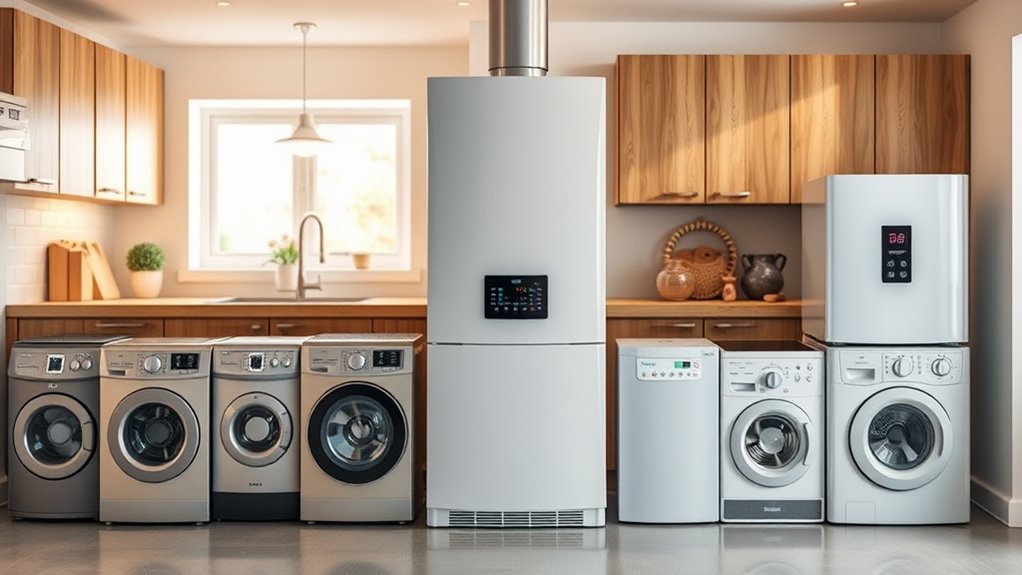
When considering boiler options for your home, it is essential to understand the different types available and their average costs. Combi boilers, which provide both heating and hot water on demand, typically range from £1,500 to £3,000, depending on the brand and efficiency. Their compact size makes them ideal for smaller homes. On the other hand, system boilers store hot water in a cylinder, making them suitable for larger households with higher demands. Their costs usually fall between £1,500 and £3,500, influenced by the installation complexity. Both types offer various energy efficiency ratings, which can impact long-term savings. Evaluating your household's specific needs will help you choose the right boiler and budget effectively. Additionally, considering the compliance with safety regulations during installation is crucial to ensure safe operation and avoid potential fines.
Factors Influencing Boiler Prices
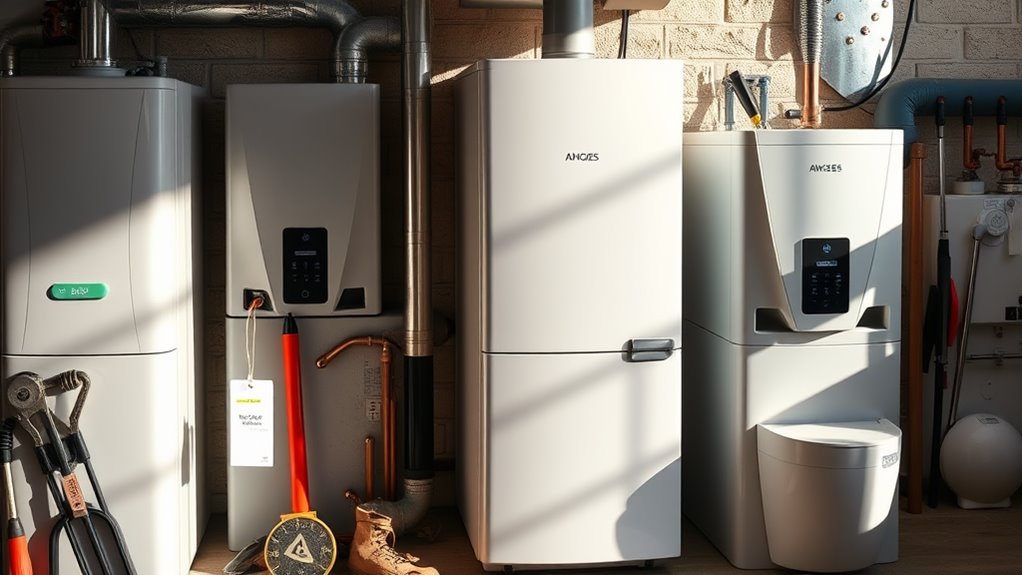
Several factors influence boiler prices, and understanding them can help you make an informed choice. Here are four key factors to contemplate:
- Energy Efficiency: Higher energy efficiency ratings typically mean higher upfront costs but can lead to savings on energy bills over time.
- Boiler Type: Different types of boilers (combi, system, or regular) have varying price points based on their design and functionality.
- Brand Reputation: Well-known brands often come with a premium price, reflecting reliability and performance.
- Boiler Warranties: Longer and more extensive warranties usually increase the cost but offer peace of mind regarding potential repairs. Additionally, investing in energy-efficient heating systems can significantly reduce your carbon footprint and operational costs over time.
Installation Costs and Considerations
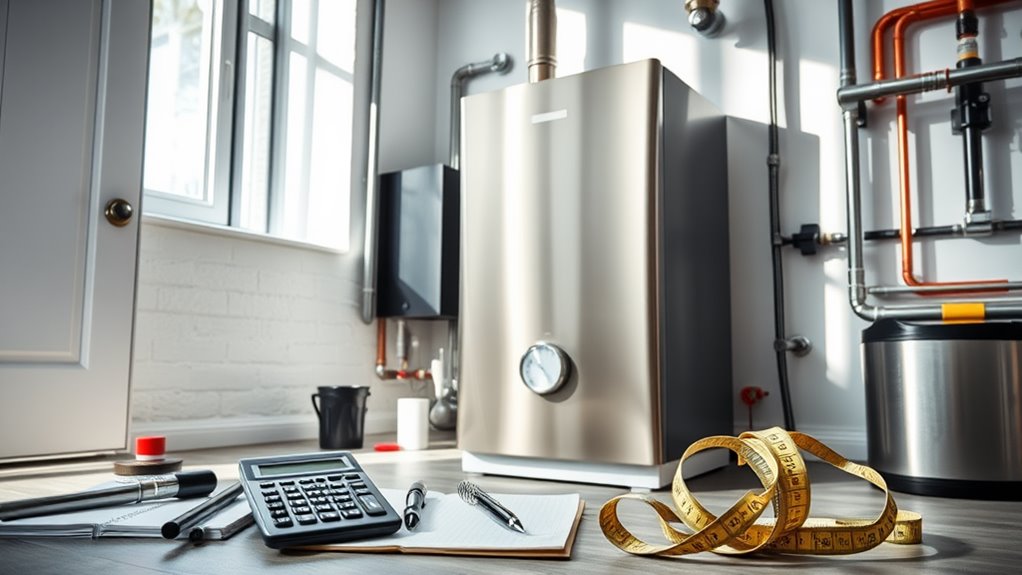
Understanding boiler prices is only part of the equation; installation costs and considerations are equally important. When you're planning your budget, factor in the installation process, as it can greatly impact the overall expense. The complexity of the installation varies based on your home's existing infrastructure, which may require modifications. For instance, if you're switching boiler types or need new piping, expect higher costs. Additionally, hiring a qualified professional is essential to guarantee safety and compliance with regulations, which can also affect your budget. Don't forget to account for any potential downtime during the installation process, as this can temporarily disrupt your daily routine. Effective budget planning will help you avoid unexpected financial strains during this pivotal phase. Regular servicing ensures safe and efficient operation, which is crucial after installation to maintain boiler performance.
Brand Comparisons and Price Ranges
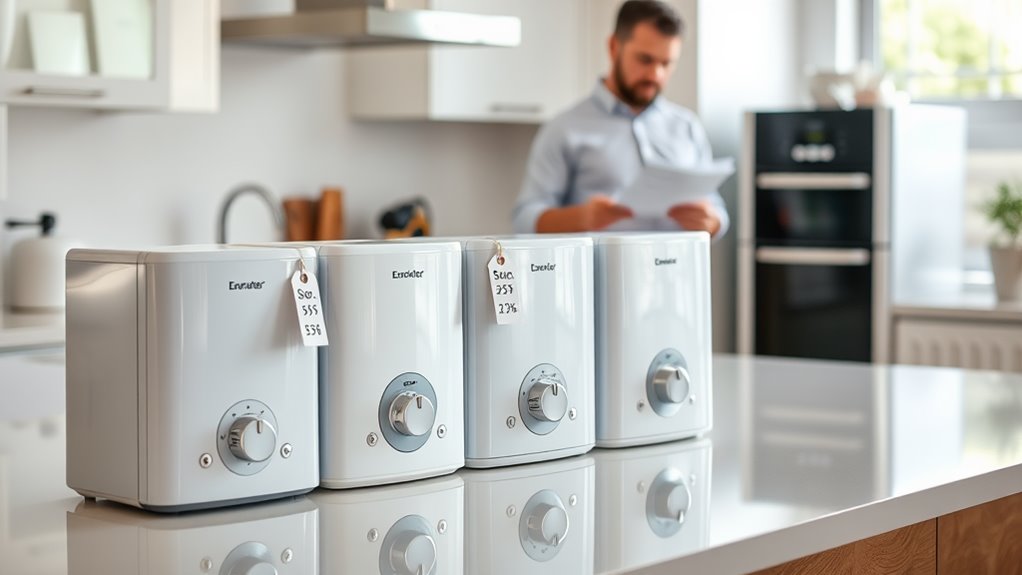
As you explore boiler options, comparing brands and their price ranges becomes essential for making an informed decision. Different brands offer varying reliability and warranty options, impacting your long-term satisfaction and maintenance costs. Here's a quick comparison to evaluate:
- Vaillant: Known for brand reliability, prices range from £1,000 to £2,500, depending on the model.
- Worcester Bosch: Offers strong warranties, with costs typically between £1,500 and £3,000.
- Ideal Boilers: Good value, priced around £1,000 to £2,000, with decent warranty options.
- Baxi: Budget-friendly, ranging from £800 to £1,800, but check warranty details. Additionally, considering energy-efficient heating options, such as heat pumps, can lead to significant long-term savings on operational costs.
Additional Costs to Consider When Purchasing a Boiler
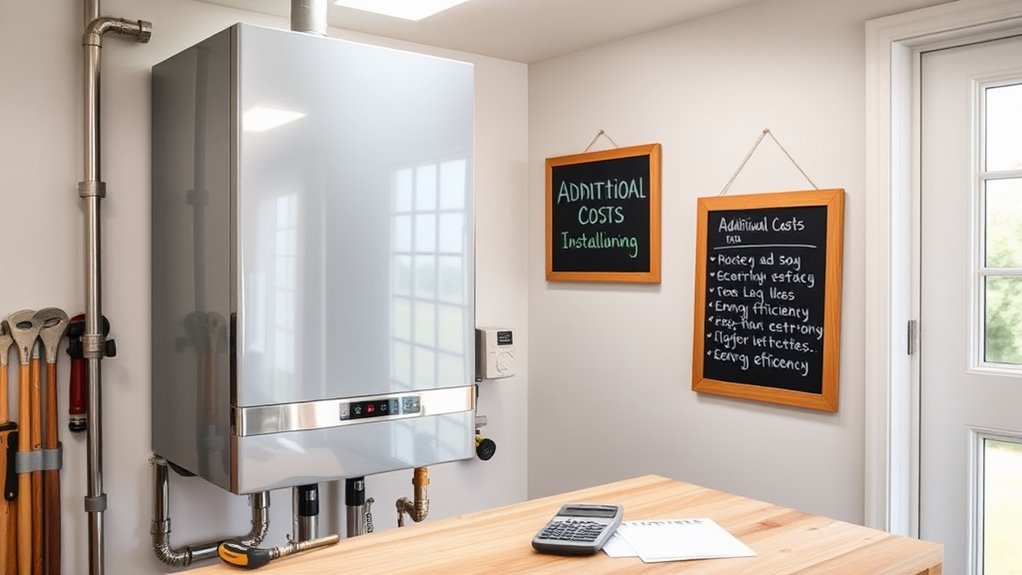
When you're budgeting for a new boiler, it's crucial to factor in additional costs beyond the purchase price. Installation fees can vary greatly, so get quotes from multiple professionals. You'll also want to take into account the boiler's energy efficiency; higher-rated models may have a steeper upfront cost but can save you money on energy bills over time. Additionally, don't overlook the importance of warranty options. A thorough warranty can protect you from unexpected repair costs, making the initial investment more worthwhile. Finally, think about any necessary upgrades to your heating system or plumbing, which could add to your total expenses. By accounting for these factors, you can create a more accurate budget for your new boiler. Regular preventative maintenance on your boiler will also help ensure its longevity and efficiency, ultimately saving you money in the long run.
Frequently Asked Questions
What Is the Lifespan of an Average Boiler?
The lifespan of an average boiler typically ranges between 10 to 15 years, depending on various factors. Different boiler types—like combi, system, and regular boilers—can influence longevity. Maintenance practices, installation quality, and water quality also play significant roles in determining how long your boiler lasts. By regularly servicing your boiler and addressing issues promptly, you can maximize its lifespan and guarantee efficient operation throughout its working life.
Are There Financing Options for Boiler Purchases?
Yes, there are several financing options available for boiler purchases. You can explore boiler grants that help offset installation costs, making it more affordable. Additionally, many suppliers offer payment plans, allowing you to spread the cost over time. It's important to compare these options to find what best fits your budget. Always read the terms carefully to understand interest rates and repayment periods before making a decision.
How Can I Maintain My Boiler for Longevity?
To maintain your boiler for longevity, prioritize regular inspections and boiler cleaning. Schedule annual check-ups with a qualified technician to identify potential issues early. Keep the area around your boiler clear of debris and guarantee good ventilation. Flushing the system periodically helps remove sludge, improving efficiency. Additionally, monitor pressure and temperature settings, making adjustments as needed. By staying proactive, you'll enhance your boiler's lifespan and maintain peak performance throughout the year.
What Warranties Are Typically Available on Boilers?
When considering warranties for boilers, you'll typically find several warranty types, including manufacturer warranties and extended service plans. Manufacturer warranties often cover parts and labor, lasting from one to ten years. Extended service plans may offer additional protection beyond the standard period. Always read the fine print to understand what's included, as warranty duration and coverage can vary greatly between brands and models. This guarantees you're making an informed decision for your investment.
How Do I Choose the Right Boiler Size?
To choose the right boiler size, you need to evaluate your home's heating needs and the types of boilers available. Calculate the required output in kilowatts (kW) based on your property's size and insulation. Pay attention to boiler types, like combi, system, or regular, as they vary in efficiency and capacity. Also, prioritize energy efficiency ratings to guarantee you're selecting a model that minimizes energy costs while meeting your heating demands effectively.
Summary
In conclusion, understanding the average cost of a boiler in the UK involves considering various types, brand differences, and installation expenses. Prices can vary considerably based on factors like efficiency and size, so it's essential to evaluate your specific needs. Additionally, don't forget to factor in potential extra costs, such as maintenance and warranties. By doing thorough research, you can make an informed decision that guarantees both comfort and efficiency in your home.

